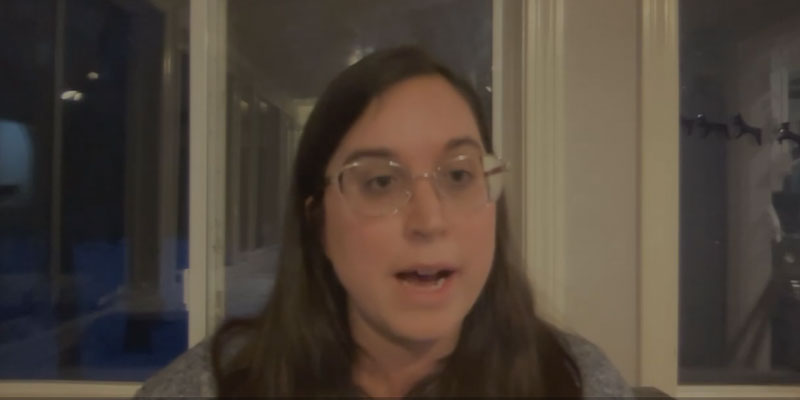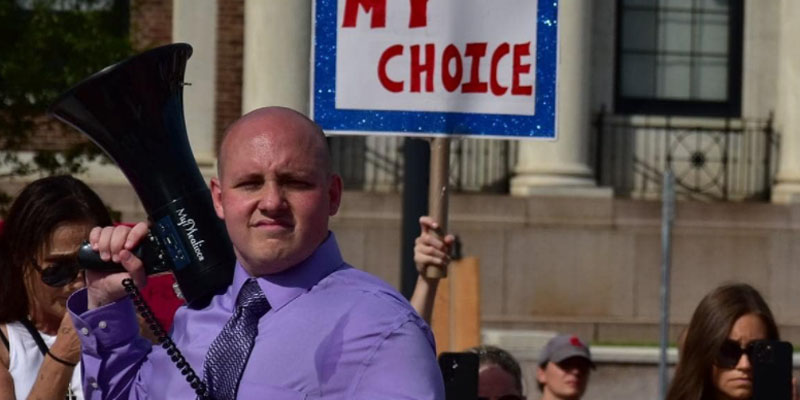That’s the question I have reading this:
[Open full post]“The impact of COVID-19 indeed goes far beyond the disease itself. Cancer touches all our lives, either directly or through its effect on family and loved ones. 1 in 4 people in Europe and Central Asia will receive a cancer diagnosis in their lifetime. It is one of the leading causes of mortality and morbidity in the WHO European Region, accounting for more than 20 percent of all deaths.
“Looking back over these past 2 years, cancer screening, diagnosis, and treatment have suffered in an unprecedented way as health services have struggled to respond to COVID-19,” the WHO Europe Director added.
About one hour and fifty-five minutes into Wednesday’s hearing of the Rhode Island House Education Committee, Democrat Representative Justine Caldwell (East and West Greenwich) jumped in with her cat from the comfort of her home to ask Democrat Senator Tiara Mack (Providence) a question about “pleasure-based sex education” legislation, of which Mack is obviously a key originator.
In essence, the door that Caldwell was trying to open for Mack was to say that this suspicious new term she wants to introduce into the state’s mandates for Rhode Island schools is really just about safe sex. If something isn’t pleasurable, Caldwell elaborated, then that’s evidence that something’s not right or isn’t safe.
Mack refused to play along. Yeah, yeah, we can say that’s part of it, but it’s not really what we’re talking about, here. “Pleasure-based sex education” isn’t narrowly about safe sex, she explained. Actually, it goes well beyond only being about sex. It’s about a whole way of viewing life, relationships, and your body. That is: reality. If this starts to seem as if Mack would like the state to establish her religion in schools, that’s exactly what she’s doing.
From the practical perspective, however, the key point to realize is that it doesn’t matter what these people say. It matters what’s in the bill. Mack and Caldwell’s assurances in a committee hearing have almost no relevance to how the law will be implemented. They know this. They’re lying in order to trick the public and give other legislators cover to pretend they thought the legislation was no big deal.
As I’ve said before, if it were no big deal, they’d change the word or take it out altogether. They know that including specifically this phrase is the key to grooming children into their ideology, if not into sex with adults.
That isn’t Caldwell’s biggest lie, however. The award for maximum dishonesty comes around the two hour, twenty minute, mark:
I have had kids in school for six or seven years, now, and I have never once thought I should be part of developing their curriculum at school, even though I have been an educator and have an advanced degree and have taught, umm, kids. I am not an expert in curriculum. Neither are many of us, and I don’t think that we should be in a place where I’m deciding what gets taught in math because I prefer this, or I decide, for example, in a timely example, that I should decide what books my kids are reading in English class. You know, we allow experts to do that. We don’t allow parents of any student to determine what goes on in their curriculum.
Think what you will about Caldwell’s approach to parenting, but telling the experts what they must teach is the entire purpose of this bill. Progressives want to mandate a particular approach to sex education in the law. If the “experts” conclude that this approach is not ideal, schools would still have to follow it. And Caldwell doesn’t think parents should have a say, either way.
This language — which even its supporters cannot define uniformly in a hearing on the bill — injects Mack and Caldwell’s ideological, religious worldview into education, down to the age of eleven (for now). At least for the time being, they can trust that “the experts” are on their side, but they want to write it into law to make sure their cult maintains its grip on your children even if the experts decide to return to facts, evidence, and respect for parents.
[Open full post]That advice has been coming to mind a lot recently.
For instance, defending his support for the child-grooming bill, Democrat Representative Brandon Potter (Cranston), asserts that about one-quarter of youth suicides are sexual minorities. He doesn’t provide a source for his claim, but let’s stipulate that the statistic might be true. It still doesn’t tell us whether children with that sort of identity are more likely to kill themselves or suicidal children are more likely to assume such identities.
This isn’t an ideological quibble. As we make decisions on the basis of statistics, how we interpret them (and the confidence with which we do so) makes a big difference.
Less controversially, the same thing applies to a Japanese study finding association between screen time and autism in boys. It could be that the screens are to blame, or it could be that greater difficulty managing and/or bonding with autistic babies and toddlers makes parents more likely to use screens as pacifiers. If we proclaim causation in the wrong direction, we can do unexpected harm — increasing autism in one direction, yes, but perhaps scaring parents away from needed relief in the other.
This topic is closely related to the suspension of Whoopi Goldberg that I mentioned earlier. For personal, ideological, and political reasons, we’ve increasingly been accepting a “conclusion first” culture. Only facts that support our conclusions are recognized, and those that don’t support our conclusions are forbidden. That can mean promoting or ignoring entire studies based on their conclusions, or it can mean insisting on particular interpretations.
I’d note that my first example in this post feels risky. Somebody who wanted to cancel me for personal, ideological, or political reasons could seize on it as if I’m harming children by dismissing their identities as related to a mental disorder. In fact, I’m only encouraging people to be careful about overconfidence. The way to increase confidence is to test alternative possibilities, and yet it’s easy to imagine researchers’ refusing to investigate the direction of causation on identity issues out of fear of being fired and ostracized.
Whatever our intentions toward children may be, the focus of our culture is actually on maintaining the ability of politicians like Potter to score political points and gain power.
Featured image by Ludovic Toinel on Unsplash.
[Open full post]Online and in testimony, enough people spoke out against legislation that would mandate the sexual grooming of school children that legislators clearly felt the heat. To my experience, they often sign onto these bills with next-to-no thought — like people signing a meaningless petition on their way into the local pharmacy. “What’s this do? OK, that sounds alright; I’ll sign.”
This comment from the primary sponsor, Democrat Rebecca Kislak (Providence), deserves note:
The primary sponsor of the bill, Rep. Rebecca Kislak, would not define what “pleasure” meant in the legislation during an interview.
“I think that one word in the legislation is not, should not be the focus here,” Rep. Kislak said.
If you suspect she’s giving away which one word is actually the heart of the legislation, you’re probably right. Otherwise, they’d just take it out. It’s a Marxist bomb, inserted into the law as if its definition doesn’t even matter, only to be an exploitable linchpin to the harm of our children and our community later.
[Open full post]She slipped up and exposed the direction of the narrative before all of the necessary special interests were pinned down. Wokism, intersectionality, anti-racism, proclamations about “white supremacy”… in all of these variations on the theme, whiteness is bad, whiteness is everywhere, and racism only goes one way. People of European descent are white; Jews are white; even Orientals can be white in some circumstances.
So, we come to Whoopi Goldberg’s comment that “the Holocaust isn’t about race.” Did it target “Jews and Gypsies,” as another host of The View, Ana Navarro, said? Well, responded Goldberg, “these are two groups of white people.”
We’re living in confused times. Goldberg’s comment exposes the absurdity of an ideology that insists white people have no race and therefore can never be victims of racism, while non-white people can never be racist. We’ve heard this said a million times. Hereabouts, we can also explain the backlash: Universalizing the Holocaust as about “man’s inhumanity to man,” in Goldberg’s words, makes it impossible to follow important threads that have run through millennia of human history.
On the other hand, another thing that makes it impossible to follow the threads of history, up to and including current events, is making such topics impossible to talk about candidly. Collectively, we need people to feel free to test out ideas openly before they become settled internally or insinuate themselves throughout our institutions in coded or academic language.
This requires balance. On one hand, we should want people to speak openly; on the other hand, the adverse reaction must be observable. But correction doesn’t have to be done with outrage or punishment. Let Goldberg give voice to her thoughts. Let Navarro respond. Eventually, they’ll grope their way to the obvious logical next step, which is to say that old-blooded Germans are just more white than Jews and Gypsies on the intersectional scale. That step will bring us closer the inevitable end point at which society manufactures a minority to persecute (those of whom nobody is whiter than), but it also brings us closer to the logical contradictions.
The key in these matters is to get there quickly, before we’ve covered over too many layers of our common sense. Hoping that the Whoopis of our society will learn from this episode that nobody can win the cancellation war is an incredible risk; more likely, they’ll learn not to speak up too confidently about anything, which plays into the hands of the social deconstructionists.
Above all, we cannot erase the status of independent adults for a momentary advantage in the ideological tug-of-war. Watching the notion of punitive suspensions make the leap from the playground of social media to an institution like ABC is terrifying. If ABC no longer wishes to be associated with Whoopi Goldberg, that would be foolish, but it would be principled. If ABC upholds Goldberg’s right to err, then it should stand by her.
We suspend students because they’re young and not yet fully accountable; we suspend athletes as an extension of penalties in a game; we suspend professionals during the course of an investigation. A punitive suspension in this case is shocking in the degree to which it exposes our cultural blindness to what words and actions truly signify. In a sense, ABC is denying Goldberg’s adulthood and human agency in an act that is uncomfortably close to a statement of ownership.
Rather than a mutually assured destruction of cancellations wherein the only test is of raw power, let’s step back from the edge and encourage people to speak, and then to change their minds.
Featured image by Ian on Unsplash.
[Open full post]The question of my subject line seems like clickbait-style exaggeration, but I can only wish it were.
Legislation up for a hearing today, as Nicole Solas warned yesterday, would require “health and family life courses” in Rhode Island schools to “affirmatively recognize pleasure based sexual relations.” As somebody who’s read scores of bills that set off all sorts of warning sirens, what I notice most of all is that this term is not defined.
Although it looks like a legal term or professional standard, it’s not defined in the law. We’re on dangerous ground when legislators start mandating that schools teach something without telling the schools what lawmakers think they’re actually requiring. A quick Internet search comes up surprisingly light in results, suggesting that the advocates pushing this particular content really don’t want the public to know what they intend to teach our children.
I emailed the primary sponsor, Democrat Rebecca Kislak (Providence), to see if she’d provide a resource that defines the term. She hasn’t answered. I also emailed the secondary sponsor, Democrat Susan Donovan (Bristol, Portsmouth). She also did not respond to the email. She did, however, leave this comment on a related Facebook post by Providence teacher Ramona Bessinger:
I signed on to updating our 6th-12th grade health curriculum to reflect the vocabulary our students are exposed to. It hasn’t been revised since 1999. Teachers need guidance. A lot has changed in 23 years-marriage equality, acceptance of sexual orientation, families with two moms or dads, the word transgender needs to be defined etc. Kids ask these questions and teachers need to be equipped with the appropriate answers. You object to the definition of “sex” as a pleasure-based activity. Please tell me if you think 6-12th graders don’t know this already?? They learn it on tv from the time they are old enough to watch. How would you define the sexual act? That it’s only for procreating?? How ridiculous. I’m suspicious of anyone who wants to ban books that have been in our schools for generations. These ideas are anti American. What’s next, asking our town library to ban the books also? What happened to free speech? Disclaimer-I taught health for 35 years. I experienced the kinds of information students seek and sought out from experts how to address those needs. Everyone is entitled to an opinion, to be sure, but I would take this post with a grain of salt.
Donovan’s comment is misleading in two ways. To start with, it’s not quite accurate to say that the legislation “updates our 6th-12th grade health curriculum.” Actually, it lowers the age at which sex education must be taught. A separate section of law addresses the “health curriculum” for grades one through twelve. Currently, the requirement for sex education is for “secondary school,” and although there may be some ambiguity, “secondary school” is typically considered synonymous with “high school,” and it is defined at least in some places as a school that concludes with a high school diploma. So, the first thing this bill does is to make sure that every school in the state must begin teaching children as young as eleven about sex.
Second, the bill doesn’t simply provide a “definition” of sex as a “pleasure-based activity,” as Donovan insists. Rather, the bill demands that schools “affirmatively recognize pleasure based sexual relations.” So, again, what does that mean? Well, simply parsing the words, it means that lessons must actively approve of relationships that are based purely on sexual pleasure. One might think that’s intended as a distinction from opposite-sex relationships, which can be procreative, so as to include same-sex relationships, but the bill separately requires affirmation of those relationships. So, what’s left for relationships that are only about providing sexual pleasure? I bet some creepy adults have an idea for an answer.
But let’s put the more inflammatory assumptions aside for a moment. Although the search results are sparse, it’s clear that “pleasure-based sex education” is a topic of discussion out there among activists. What does it mean?
An article on the website of Planned Parenthood — which is certainly part of the team when it comes to the education establishment and teachers unions — such sex ed “emphasizes that sexual activity should be pleasure-focused.” I italicized “should be” because it shows the underlying intent of the term. “It normalizes the idea of giving and receiving pleasure” as the central purpose of sex and, indeed “not just in sexual activity, but in relationships as a whole.”
If you’re not “on the team,” this content gets very disturbing very quickly. The article goes on to explain that “the best place to start talking about sex-positive sex education is to talk about what feels good.” For example:
For younger students, a good activity is having them list the things they do that feel good, like taking a bubble bath or playing in the park with their dog. By focusing the conversation on normal pleasure-seeking, you begin to normalize seeking pleasure in sexual relationships. We also get children and teens used to seeking people and activities that bring them joy and fulfillment!
Yes, that paragraph does do what you think it does. It encourages teachers to reference bubble baths and playing with pets as a precursor to sexual “pleasure-seeking” and “people and activities” that can give them pleasure. This is grooming.
The inflammatory assumptions can’t help but return to the conversation. Nothing in the language from Planned Parenthood or H7166 would rule out children having relationships with adults that bring each of them sexual pleasure. In this light, controversy over pedophiliac content in books like Lawn Boy and Fun Home takes on its full significance and amplifies the importance of defining the term in the bill.
As I wrote this, Representative Donovan responded to me on Bessinger’s Facebook page telling me that if I want a definition of the term, I should “email Senator Mack.” That would be Democrat State Senator Tiara Mack, who is “unapologetically… queer,” a term which should probably be defined more clearly, too, and who tweeted this morning that “Teaching comprehensive, queer inclusive, pleasure based sex ed was a highlight of my time teaching.” It appears that she’s referencing volunteer work teaching “comprehensive sex ed” as part of her Ivy League education at Brown, before becoming an activist for Planned Parenthood.
So, we come full circle. A sponsor of this legislation refers me to a state senator who is an activist for Planned Parenthood, which organization promotes lessons about playing with the family dog as a precursor to sexual pleasure… and which, let’s not forget, makes a fortune killing the unborn babies conceived through “pleasure based sexual relations.”
These legislators are either deeply, deeply sick, pathologically ideological, or criminally negligent in their duties as elected representatives. There really isn’t another possibility.
[Open full post]Every week, Rhode Island journalists break news about mainstream candidates for high-profile public offices like governor and dig for clues about candidates who may not yet have announced. It seemed strange, therefore, that we know so little about independent candidate Paul Rianna.
No speculation is needed; he’s definitely running. He’s also proven a willingness and ability to be actively engaged and to motivate others. As a prominent organizer involved with protests against Democrat Governor Daniel McKee’s vaccine mandate for healthcare workers — which Monique Chartier estimates drove 1,300 professionals out of their jobs during a shortage in their line of work — Rianna would be much more widely recognized were he advocating for progressive causes rather than freedom.
The governor illustrated this point when he asked Rianna about the job that he lost and had no response (probably because he wants to believe his opposition is merely astroturf, rather than grassroots).
In order to get to know Rianna a little better, Anchor Rising sent him some questions:
Anchor Rising: What did you do for work before Governor McKee’s vaccination mandate, and how long had you done it for?
Paul Rianna: I was a CNA for five years where I specialized in long-term Healthcare in Rhode Island nursing homes, and most recently I was a mental health worker at Fatima Hospital in North Providence.
AR: What are you doing now?
Rianna: I am currently unemployed due to the vaccine mandate, but keeping the Faith that one day as Rhode Island’s next Governor, I will be able to overturn the mandates and get everyone back to work.
AR: You’ve been involved with one of the larger long-term protests I’ve seen in Rhode Island. How did that come together?
Rianna: When McKee announced his heavy handed mandate against those in the Healthcare profession I decided to take action. I wanted to try to unite ALL Rhode Islanders, whether they be vaccinated or unvaccinated, under one common goal: FREEDOM.
AR: What made you decide to run for governor rather than, say, a seat in the General Assembly?
Rianna: I felt like for me to make the impact I was aiming for, I needed to aim for the top. I felt like by running for Governor, I would be able to help ALL Rhode Islanders, not just one side. I want to help return Rhode Island to what it once was, and make it as great as it can be. People need new leadership, and they need fresh ideas instead of just the same old politicians that keep following the same agenda.
AR: Do you hope to accomplish anything with your campaign other than winning the office?
Rianna: I hope to help wake people up to the fact that our state needs BIG changes. Our policies haven’t been working, we need to hold people accountable and demand them to do their jobs CORRECTLY, and most of all, we need our Government to start representing THE PEOPLE.
AR: What else in your background is relevant to the job of Governor?
I’ve done a lot of work in my community, as I am living proof as someone who was born and raised in South Providence that even through the darkest times you can still come out in the end as a winner, and accomplish anything you set your mind to.
I proved my leadership as a CNA during the height of the pandemic, I always advocated for my residents as well as my coworkers, and I spoke up against the Raimondo Administration for their mismanagement during the nursing home crisis.
I’d really like to be a voice for the voiceless, and make everyone feel like THEIR voices will be heard too…Nobody should ever feel silenced by their own Government.
Over the course of my life I’ve held many different types of jobs, which means I have REAL life experience unlike most of our elite politicians. I think Rhode Island needs someone they can relate to, someone who has experienced the struggle, and someone they will be able to rely on for transparency.
Featured image from Paul Rianna’s Facebook page.
[Open full post]These events will surely be mentioned in history books, so it’s very strange that they aren’t a bigger part of the news:
The border crossing between Coutts, Alberta (CA) and Sweet Grass, Montana (USA) continues to be blocked as truckers allied against COVID-19 restrictions and vaccine passports are united. The Alberta protests are in support of the larger trucker protest taking place in Ottawa.
Tensions are increasing as the truckers are refusing to move, but the [Royal Canadian Mounted Police (RCMP)] has vowed to get rid of the blockade. Supporters for the truckers are working through freezing temperatures to keep them supplied with food and fuel to keep the blockade in place. Even farm tractors have joined the effort.
The existence of a crowdfunding campaign to pay resulting legal bills brings to mind the time, recently, when celebrities (including the current vice president of the United States, Kamala Harris) campaigned for bail funds for violent left-wing protesters.
[Open full post]Democrat Representative Michelle McGaw (House district 71) expressed a telling thought in response to her Republican colleague, Brian Newberry, when he noted that 400 people had signed up to testify on “the proposed extension of the Governor’s emergency powers”:
Have you determined how many of those have credentials in public health, infectious disease or epidemiology?
I’ve been around long enough to be highly cynical about the use of public testimony to the General Assembly. The whole system is designed to make you feel like you’ve got an opportunity to be heard while having nearly zero influence on the laws that actually govern you. McGaw is essentially saying the quiet part out loud.
You may have voted in the election that put her in office, but she doesn’t actually care what you think. Whatever perspective you bring to the table, you’re just a child to be managed by people she credits as experts.
[Open full post]The world’s got trouble! With a capital T, and that rhymes with C, and that stands for “coal.”
My obvious reference to a once-famous song from The Music Man is tuned to have just about as much appeal to a young audience as a characteristically droning video clip from John Kerry about the need for — you guessed it! — renewable energy in response to the “trouble” of increases in coal. Of course, as I write for Accuracy in Media, there are some catches he slow-talks past.
First (of course) is the prominence of China in the coal calculation. Then, there’s this:
If the young viewers of NowThis videos were to follow their curiosity down that path, they would soon discover that Kerry’s boss and patron bears much of the blame. Within a week of taking office, President Joe Biden issued an executive order to “pause new oil and natural gas leases on public lands or in offshore waters.” He also killed the Keystone XL Pipeline, restricting the ability of Canadian oil to keep energy prices down.
NowThis may append the word “news” to its name, but it’s not news; it’s propaganda. Watching the ancient-looking John Kerry “umm” his way through a barely coherent pitch clinches the argument that pushing the message is the point, not informing or entertaining the audience.
[Open full post]






